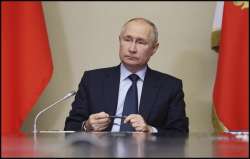Russian President Vladimir Putin has sought another presidential term in the country, extending his rule by another six years as he enjoys widespread support despite the Russia-Ukraine war. Putin has served over two decades as Russian President, from 2000 to 2008 and then from 2012 onwards.
"I will run for the post of president," said Putin as shown in television footage at an event in Georgievsky Palace, where he awarded Ukraine war veterans with the Hero of Russia gold star, Moscow's highest military honour.
The development came after Russian lawmakers on Thursday announced the date of the country’s 2024 presidential election for March 17. Members of the Federation Council, Russia’s upper house of parliament, voted unanimously to approve a decree setting the date and Putin was widely expected to contest for a fifth term.
Putin's image stays intact despite disruptive events
The 71-year-old Kremlin leader changed constitutional reforms that allowed him to remain in power until 2036. Having established tight control over Russia’s political system, Putin’s victory in the March election is all but assured. Prominent critics who could challenge him on the ballot are either in jail or living abroad, and most independent media have been banned.
However, Putin's reign has come with some flaws, notably a costly war with Ukraine that killed thousands of his countrymen and repeated attacks inside Russia, including one on Kremlin itself. A failed rebellion last summer by mercenary chief Yevgeny Prigozhin also raised widespread speculation that Putin could be losing his grip.
However, Prigozhin's death in a mysterious plane crash two months later reinforced the view that Putin was in absolute control. About 80% of the populace approves of his performance, according to the independent pollster Levada Center.
The upcoming elections will also mark the first time that residents of the occupied Ukrainian regions of Donetsk, Luhansk, Zaporizhzhia and Kherson, occupied by Russia during the Ukraine conflict, will participate in the presidential elections, CNN reported
Who will oppose Putin?
Putin is expected to face only token opposition on the ballot for the March election, whether due to real or coerced support. He is already the longest-serving Kremlin leader since Communist leader Joseph Stalin.
In 2008, when he stepped aside to become prime minister due to term limits but remained Russia's driving force, presidential terms were extended to six years from four. Another package of amendments he pushed through three years ago reset the count for two consecutive terms to begin in 2024.
Two people have announced plans to run: former lawmaker Boris Nadezhdin, who holds a seat on a municipal council in the Moscow region, and Yekaterina Duntsova, a journalist and lawyer from the Tver region north of Moscow, who once was a member of a local legislature. For both, getting on the ballot could be an uphill battle.
According to Russian election laws, candidates put forward by a party that is not represented in the State Duma or in at least a third of regional legislatures have to submit at least 1,00,000 signatures from 40 or more regions. Those running independently of any party would need a minimum of 3,00,000 signatures from 40 regions or more.
Those requirements apply to Putin as well, who has used different tactics over the years. He ran as an independent in 2018 and his campaign gathered signatures. In 2012, the Kremlin’s United Russia party nominated him, so he didn’t need them.
(with inputs from agencies)
ALSO READ | 'Cannot imagine Modi could be...': Putin says that he's 'surprised' by Indian PM
Latest World News
